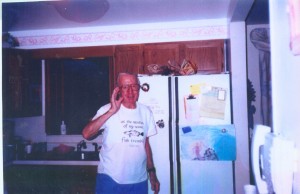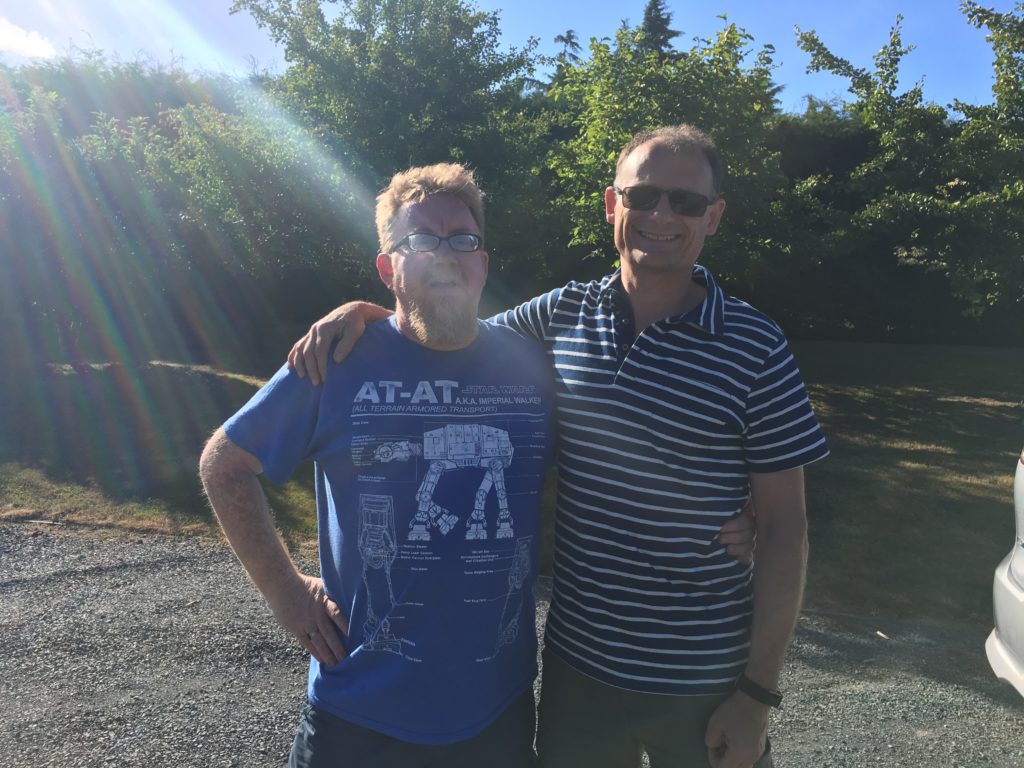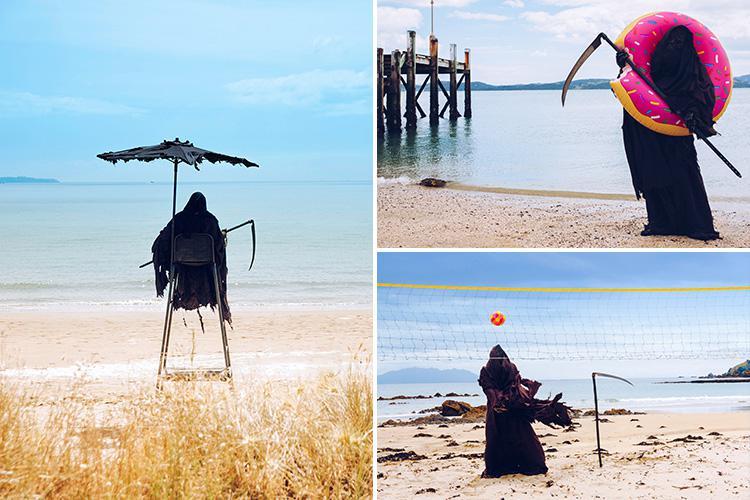We spent most of Saturday in the park. I know, it’s not very glamorous, but you see, we were celebrating an anniversary.
Now, some of my friends no doubt spent this remarkable centenary in the dark of the theater. And at least two I know celebrated it in truly lavish style, dressing like their counterparts a century ago and eating the very foods on which they dined that historic day.
But our anniversary didn’t celebrate a shocking tragedy that cost scores of lives. We were marking the 100th anniversary of my grandpa John’s birth. The fact that he was born on the exact day that the Titanic met with that fateful iceberg only made it easier for me to remember that historic event. I only ever saw one of those things as worth celebrating. [Note: my mom just corrected me about something rather embarrassing. My grandpa’s birthday was actually April 5, not April 15. April 5 is the date the Titanic launched, which was the source of my confusion. The sentiments that follow remain true, but for future reference, I am A Bad Granddaughter.]

The Kresser brothers: Fritz, Rudy, John, and Augie
Let me tell you a bit about John Kresser. He was the first child of his family born in America–his parents and older siblings moved to Wisconsin from southern Germany (technically part of Austro-Hungarian territory) a few years earlier. He was one of ten children who lived to adulthood, five boys and five girls. They were too poor to keep the milk their cow produced, so rickets gave him bowed legs like a cowboy forty years in the saddle. He went to work after he finished fourth grade. When the Depression hit, he went into the Civilian Conservation Corps in upstate Wisconsin.
John met my grandma, Nell (of whom I’ve written before), and they dated briefly before marrying in 1935. During the courtship, he would take her out on Friday nights. He offered to buy her ice cream; she suggested that they should go out for a beer. It wasn’t until after they’d married and she started turning down beer when offered that he thought to ask why she’d always suggested it for their dates. Her answer: she figured that, as a German, he’d much rather have a beer after a hard day’s work. His answer: no way, I’d have much rather had the ice cream! 62 years together wasn’t nearly enough.
He worked at Ladish Company for 40 years, pulling seamless rings of burning steel from beneath the four-story pneumatic hammer that pounded them flat. Even on the hottest day of the year, he had to cover every inch of his skin in at least two layers, to prevent burns. These were the days before OSHA regulations, and he suffered significant nerve deafness from the constant percussion of the hammer. His fingers were gnarled and crippled like jagged bolts of lightning. But those hands were capable of great skill and delicacy. He tied his own fishing jigs and lures, and crafted wooden fittings and furniture.

My grandpa, holding one of his salmon next to my brother Tim
Quite simply, nature was his domain. He fished for coho salmon on Lake Michigan in his 15-foot aluminum canoe, and the ones he brought back often overhung the cooler on both sides, 22 inches of flashing silver wrested from the deep. He hunted deer every fall, and nothing ever went to waste. He grew dozens of beautiful flowers, but his irises and roses were stunning. Vegetables flourished in the backyard all summer long, a lush backdrop to his Wile E. Coyote-like battle with the squirrels that feasted at his birdfeeders.
In every undertaking, he fretted, tweaked, measured, re-measured, jiggered, and planned until the product was meticulous. It drove my grandma, with her Irish practicality and genius for the slap-dash and shortcut, rather mad. But the combination of them was just about perfect, and they played a huge role in raising my siblings and me. Weekends, vacations, long summers–any stretch of days was an excuse to hitch their pop-up canvas trailer to the car and head for parts unknown. We cooked over campfires, read by kerosene lanterns, and slept in sleeping bags with the skies of mountains and deserts, coastlines and great plains above our green canvas tent.
They showed us the wonder to be found close to home, too. They would take us on long, rambling nature walks in the birch forests on the cliffs above Lake Michigan, letting us collect treasures like the armloads of wildflowers I would amass (even though they made us all sneeze), while teaching us the values of preservation and the beauty of a thing in its proper environment. My grandma named the plants and animals for us; my grandpa named the trees and tracks.

My grandpa with (L to R) my cousin Star, my sister Jenn, and me
While he was a man of quiet dignity, faith, and pride, he was happily a fool for his grandkids. He rode sleds, roller coasters, and water slides with us. He ate every dubious baking effort, accepted our art projects like treasures of the western world. We’ve got Super 8 footage somewhere of him playing with my cousin in Rocky Mountain National Park. She’s from Florida, so snow was always a special treat. In the film, she decides she wants to slide some snow down Grandpa’s pants, so she sneaks up behind him and starts trying to cram a snowball past his belt. But Gramps was a skinny guy, pants always tightly cinched, so there’s nowhere to slide the chilly bundle. Not wanting to disappoint her, the film shows him unbuckle his belt, undo the top button of his pants, then hold the back open for her. In goes the snowball, and my cousin claps with glee, as Grandpa does a herky-jerky dance of put-on shock and discomfort. Anything for the kids.
So it was a no-brainer to celebrate his birthday out in nature. We talked of him as we walked to the park, as I named the trees with their buds unfurling. I watched the wind in the branches as I sat beside the playground, and I thought of what he would have made of my two bright boys. What hijinks they would talk him into. What wisdom he would etch in their hearts. 100 years after he came into this world, I still look at it the way he taught me: with reverence and gratitude for all its gifts.

 Earth Sciences, New Zealand Studies, Uncategorized
Earth Sciences, New Zealand Studies, Uncategorized  No Comments
No Comments 


 When I was in college, I had the great good fortune to see Kurt Vonnegut, Jr. speak on campus. He was as hilarious, irreverent, and insightful as his books. I wish I remember more of what he discussed, but just one thing has survived the years and leaks of memory.
When I was in college, I had the great good fortune to see Kurt Vonnegut, Jr. speak on campus. He was as hilarious, irreverent, and insightful as his books. I wish I remember more of what he discussed, but just one thing has survived the years and leaks of memory.



